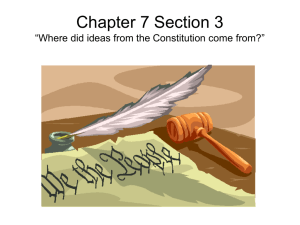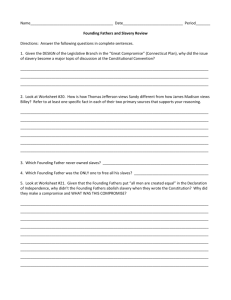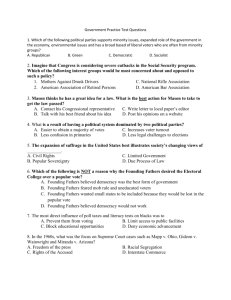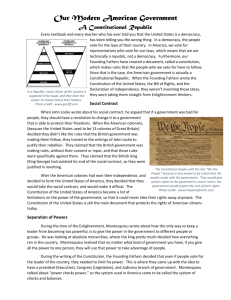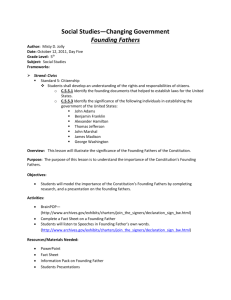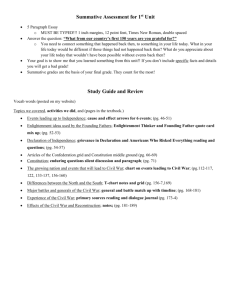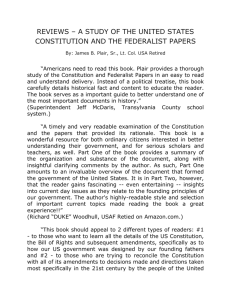Examining Article IV of the US Constitution
advertisement
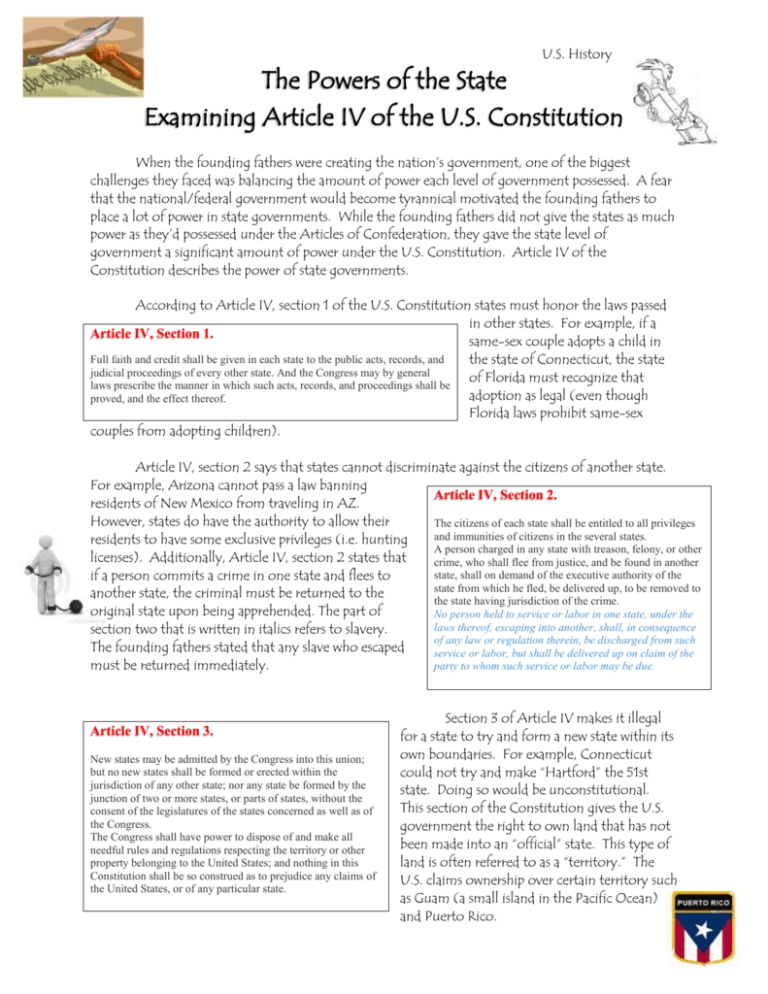
U.S. History The Powers of the State Examining Article IV of the U.S. Constitution When the founding fathers were creating the nation’s government, one of the biggest challenges they faced was balancing the amount of power each level of government possessed. A fear that the national/federal government would become tyrannical motivated the founding fathers to place a lot of power in state governments. While the founding fathers did not give the states as much power as they’d possessed under the Articles of Confederation, they gave the state level of government a significant amount of power under the U.S. Constitution. Article IV of the Constitution describes the power of state governments. According to Article IV, section 1 of the U.S. Constitution states must honor the laws passed in other states. For example, if a Article IV, Section 1. same-sex couple adopts a child in Full faith and credit shall be given in each state to the public acts, records, and the state of Connecticut, the state judicial proceedings of every other state. And the Congress may by general of Florida must recognize that laws prescribe the manner in which such acts, records, and proceedings shall be adoption as legal (even though proved, and the effect thereof. Florida laws prohibit same-sex couples from adopting children). Article IV, section 2 says that states cannot discriminate against the citizens of another state. For example, Arizona cannot pass a law banning Article IV, Section 2. residents of New Mexico from traveling in AZ. However, states do have the authority to allow their The citizens of each state shall be entitled to all privileges and immunities of citizens in the several states. residents to have some exclusive privileges (i.e. hunting A person charged in any state with treason, felony, or other licenses). Additionally, Article IV, section 2 states that crime, who shall flee from justice, and be found in another state, shall on demand of the executive authority of the if a person commits a crime in one state and flees to state from which he fled, be delivered up, to be removed to another state, the criminal must be returned to the the state having jurisdiction of the crime. original state upon being apprehended. The part of No person held to service or labor in one state, under the laws thereof, escaping into another, shall, in consequence section two that is written in italics refers to slavery. of any law or regulation therein, be discharged from such The founding fathers stated that any slave who escaped service or labor, but shall be delivered up on claim of the must be returned immediately. party to whom such service or labor may be due. Article IV, Section 3. New states may be admitted by the Congress into this union; but no new states shall be formed or erected within the jurisdiction of any other state; nor any state be formed by the junction of two or more states, or parts of states, without the consent of the legislatures of the states concerned as well as of the Congress. The Congress shall have power to dispose of and make all needful rules and regulations respecting the territory or other property belonging to the United States; and nothing in this Constitution shall be so construed as to prejudice any claims of the United States, or of any particular state. Section 3 of Article IV makes it illegal for a state to try and form a new state within its own boundaries. For example, Connecticut could not try and make “Hartford” the 51st state. Doing so would be unconstitutional. This section of the Constitution gives the U.S. government the right to own land that has not been made into an “official” state. This type of land is often referred to as a “territory.” The U.S. claims ownership over certain territory such as Guam (a small island in the Pacific Ocean) and Puerto Rico. Article IV, Section 4. The United States shall guarantee to every state in this union a republican form of government, and shall protect each of them against invasion; and on application of the legislature, or of the executive (when the legislature cannot be convened) against domestic violence. The section of Article IV prohibits any state from adopting a different form of government. This section of the Constitution makes it illegal for Delaware to become a monarchy or New Hampshire form adopting a military dictatorship as their new form of government. This section of the Constitution also requires the federal government to provide protection to states from foreign invasion (i.e. if Canada attacked Maine, the federal government would have to protect Maine) and protection from domestic riots. Why State Government Matters Imagine if you learned that the school year had been extended from 180 days to 250 days per year. How would you feel? Imagine that the driving age was raised to 19 years of age. How would you feel? Both of these hypothetical scenarios could occur, but it is unlikely that such bills would be passed by the federal government. If these bills were made into law, it would happen through the actions of the state government. Most Americans pay little attention to their state governments (i.e. while most people can identify their state’s governor, few can name any other elected officials in their state government). Most Americans pay much more attention to the federal government. During the midterm elections of 2014, countless media stories covered the potential Republican take-over of the Senate (which occurred, as predicted). What most Americans fail to realize is that their state governments have a much more direct impact on their lives than does the federal government. In 2014, the legislative branch of the federal government passed 185 laws. State governments passed over 24,000 laws during that same time period! These laws affect the lives of the residents of those states in many different ways. Some states have raised the minimum wage (in fact the minimum wage in most states is higher than that required by the federal government). Some states have legalized marijuana is recent years. Other states have passed laws that affect the health care, education, environment and job safety of the people who live there. Despite the enormous impact that state government has on the lives of its citizens, most Americans pay little/no attention. In fact, 25% of people running for seats in their state legislatures, ran unopposed (meaning they were automatically elected because no one ran against them)! A woman from Oklahoma who publically stated that African-American children do not work as hard in school as their white counter-parts was elected in 2014 (she ran unopposed). A man who wanted to repeal laws protected disabled people in Florida was elected in 2014 (he also ran unopposed). A Rhode Island man who was arrested for drunk driving and threatened the arresting officer, was also elected in 2014 (….you guessed it, he ran unopposed). Name: Date: Core: U.S. History The Power of the States: Reflection Questions Directions: Use today’s reading “The Power of the State: Examining Article IV of the Constitution” to answer the following questions. 1. Why did the founding fathers fear giving too much power to the national/federal government? ___________________________________________________________________ ______________________________________________________________________________ 2. The vast majority of the founding fathers supported slavery. Identify a section of Article IV of the U.S. Constitution that supports the preceding statement and explain how the section shows the founding fathers supported slavery. Section _______________ shows that the founding fathers supported slavery because: _______ ______________________________________________________________________________ ______________________________________________________________________________ (do not simply paraphrase/quote the section. You must explain how the section shows that founding fathers supported slavery!) 3. John lives in Louisiana. The driving age in Louisiana is 15 years of age. John receives a Louisiana state driver’s license at the age of 15 ½. Two months later, while on vacation in Connecticut, he drives his car from Hartford to New London. The driving age in Connecticut is 16 ½. If John were to be pulled over by a police officer, could he be arrested for under age driving? You must use specific evidence from Article IV of the U.S. Constitution to support your position. I think that John _________ (could or could not) be arrested for under age driving in Connecticut because: ____________________________________________________________ ______________________________________________________________________________ ______________________________________________________________________________ ______________________________________________________________________________ 4. Identify the section of Article IV was most likely a response to Shay’s Rebellion in January of1787? Explain your answer. ______________________________________________________________________________ ______________________________________________________________________________ _____________________________________________________________________________ 5. True or False. The state of Rhode Island could legally pass a law prohibiting residents of Connecticut from owning property in Rhode Island. This statement is ___________ (true or false) because: _________________________________ ______________________________________________________________________________ ______________________________________________________________________________ ______________________________________________________________________________ 6. After the 1898 Spanish-American War, the United States government gained control of the Philippines, an island nation located off the coast of Asia (formerly controlled by the Spanish). Identify the section of Article IV of the U.S. Constitution allowed the U.S. government to take over this land. Fill your answer in the blank space below. Article IV, section ____ allowed the U.S. government to take over the Philippines. 7. Describe how Article IV, section 4 helps to keep the United States of America “unified.” You must state two different ways that section 4 keeps the states united. ______________________________________________________________________________ ______________________________________________________________________________ ______________________________________________________________________________ ______________________________________________________________________________ 8. Should more Americans be paying attention to the state level of government? Support your position with two persuasive facts from the text. ______________________________________________________________________________ ______________________________________________________________________________ ______________________________________________________________________________ ______________________________________________________________________________ ______________________________________________________________________________ ______________________________________________________________________________ ______________________________________________________________________________ ______________________________________________________________________________ ______________________________________________________________________________ ______________________________________________________________________________ ______________________________________________________________________________
